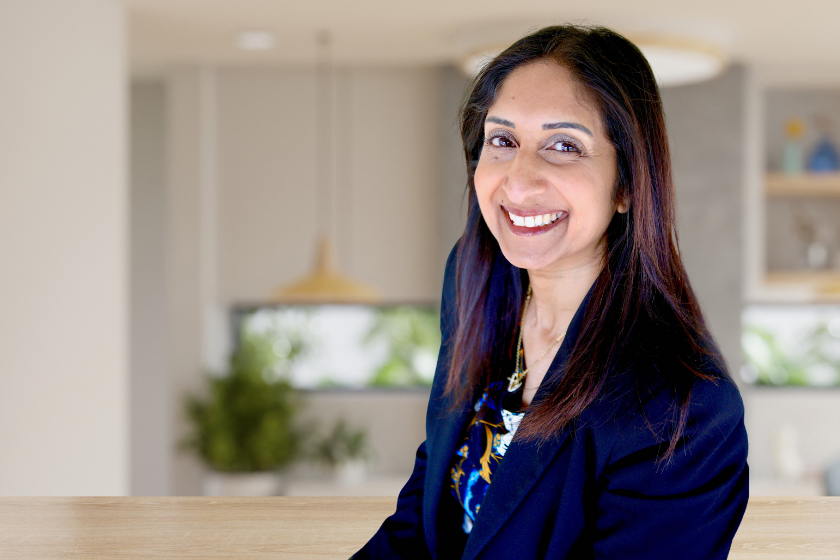Anthony Tripolino FIPA: Lessons from teenage side hustles
Having proven his entrepreneurial flair as a teenager, Anthony Tripolino FIPA was taught lessons around work ethic by...
READ MORE
Early in her career, Sandra Andrews was told she couldn’t wear pants to work – a partner didn't like the way they looked on women. No one else would speak up, but she didn’t accept it. Sandra’s a problem solver, and now she runs her own practice offering ‘virtual CFO’ services on retainer. It simplifies her invoicing and cash flow, and has helped grow the practice to a team of six with 600 clients.

Sandra Andrews was the first person in her family to graduate from university.
“Both my parents immigrated to Australia from Mauritius. They came with nothing and had to give up a lot to put me and my two sisters through private school,” says Sandra.
“Getting a university degree and a decent job was my way of showing gratitude to my parents for everything they did to give us the life that we have today.”
Sandra shares with Public Accountant how she gained diverse experience early in her career, established Next Generation Accounting and Tax as a ‘virtual CFO’ to her clients, and built it through a retainer model of engagement.
During my university years I worked in retail. I started as a cashier and then I volunteered to take on extra work so that I could get experience in the payrolls department.
I also studied part-time in my final year of university because I wanted to gain more experience that would differentiate myself from other graduates. I completed the Income Tax Course that year. I was also doing tax preparation for a company but because I was undertaking an accounting degree, they moved me into their accounting division. It was there that I got experience in year-round accounting for clients.
I wanted to dip my toe in everything and gain as much experience as I could, so I worked for large accounting practices, small ones, did commercial accounting and worked for the local government. I also gained experience in mortgage brokerage. Having that knowledge of lending has really helped me in accounting.
Being an ethnic woman in large, male-dominated accounting practices was difficult. I had one partner who told me I wasn’t allowed to wear pants at work because he didn’t like the way they looked on women.
I told the partner that was absurd and that I was going to wear what I wanted. No one else would say anything, but I wasn’t going to put up with that.
I indicated that I wasn’t going to tolerate that sort of behaviour.
The situation has changed now that there are many more women in the industry. There’s a new generation coming through with different views who certainly wouldn’t tolerate that sort of behaviour.
After gaining experience in mortgage brokerage, I worked for a sole practitioner who essentially let me build my own business underneath his. He retired about five years ago so it was then that I went out completely on my own, set up my own office and established a team.
When I started out, it was just me. The business has grown organically through receiving a lot of client referrals. I have a great team and empower them to work autonomously, while also having an open door policy whereby they can come in and ask questions whenever they want. We have six staff now and look after 600 clients.
We operate our business primarily through value-based invoicing. We charge most of our clients a monthly or yearly fee to manage their business. We are a virtual CFO for our clients. We manage their staff, payroll, bookkeeping, end of year accounts.
Clients often complain that they’ve previously been invoiced for absolutely everything, but we much prefer this approach and so do our clients. We’ll say it will cost them X amount per year for us to manage their business. They can contact us whenever they need as we don’t charge for each individual item.
Value-based invoicing also helps with our cash flow. We receive a monthly or quarterly payment from our clients, so we’re not having to chase them for one large bill. It also simplifies our processes. The system automatically generates and sends out an invoice, and we then receive the monthly or quarterly payment.
A lot of clients complain they just become a number when they’re dealing with a large firm. They want someone who will work alongside them and help them with issues they’re facing in their business. We provide a very personalised service, and I’ve become my clients’ go-to person for everything. I have a good network so I can refer them to someone if I can’t assist them with something they need.
We also have a client-first mentality and assist our clients with any issue they’re experiencing, whether or not they have an appointment.
This year we’re focusing on Destiny Rescue. It’s an amazing organisation that does incredible work to save children from child sex trafficking. We held a high tea to raise funds and awareness about their work.
When selecting a charity, we usually focus on ones that support vulnerable children or Indigenous people. I do a lot of research into the charities before we choose to support them, looking at the work they’re doing and where the money is going. I like supporting the smaller ones that are more ground-based rather than larger ones that often have a lot of support.
My husband is Indigenous and therefore my children are, so that’s why we focus a lot on charities operating in that space. At the moment I’m also mentoring an Indigenous artist, helping her grow and develop her business. I think it’s really important to give back.